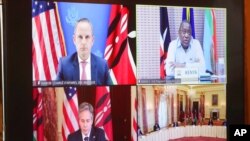Tuesday’s six-stop Africa “trip” was a first by a U.S. secretary of state - more so because he did not actually go anywhere – featuring virtual meetings with top leaders in continental heavyweights Kenya and Nigeria.
Antony Blinken says protecting global human rights through good governance is a cornerstone of American foreign policy, and he hit those points hard in his opening event Tuesday with alumni of the U.S. government’s Young African Leadership Initiative.
But the casual nature of the virtual exchange -- which he called “Ten Questions with Tony,” did not stop these young Africans from asking the new top U.S. diplomat tough questions about everything from climate change to Chinese influence to growing extremism on the continent.
It all comes down, he said, to good, transparent governance.
“We're very much committed to working with partners to advance peace and security in Africa,” he said. “In the short term, sometimes that looks like security partnerships, conflict mitigation support and diplomatic advocacy on human rights. Ultimately, I think the most important thing that we can do is to help countries where possible strengthen their democratic institutions, strengthen the ability to deliver progress for people, economic growth, and that that's the real foundation that we need to put in place.”
The online nature of the visits meant that Blinken, from the comfort of his Washington office, traversed huge distances in no time. After meeting virtually with the YALI alumni, he zipped over to Nigeria, where he met with the president and foreign minister -- and 90 minutes later, clear across the continent to meet with Kenya’s president and foreign minister. He also spoke with officials in both countries about their efforts to battle the coronavirus pandemic.
The secretary did not shy away from discussing the metaphorical elephant in the virtual room: America’s largest adversary, which is making serious inroads in Africa.
“China is a global competitor and competition is a good thing as long as it's basically fair and the playing field is level,” he said. “But as we look at it, we have different approaches to governance, we have different approaches to business, we have different approaches to security, and the fundamentals sometimes of our partnerships are quite different.”
With this visit, Blinken could outpace his predecessor in terms of engagement on the world’s fastest growing continent. Under previous U.S. President Donald Trump, two secretaries of State visited Africa, once each. Blinken’s staff says this visit will not be his last, and that he hopes to make an actual trip once it is safe to travel again. In the meantime, he said, he will play it safe and listen to the voices from the world’s youngest population.
“The most important thing we have is to hear and to listen to new voices, young voices, fresh perspectives, new ideas,” he said. “No one has a monopoly on ideas, never mind good ideas. And as you're bringing these ideas to the marketplace of ideas, it's going to make for a much more powerful and abundant market and I think that's the way we get progress.”
Blinken’s remarks did not deviate much from longstanding U.S. policy on Africa. What made this virtual visit different was the optics of a top American official listening -- for hours on end. Blinken, for all of his standard diplomatic lines, appears to be casting himself as a new kind of American diplomat.
For example, one of his staff in Nairobi revealed that he is almost certainly the first top U.S. diplomat who has dropped three original songs on music-streaming service Spotify. (Find them here.) A music critic described his rock-infused ballads, which Blinken himself calls “wonk rock,” as “a decent amateur demo.”
The message of Tuesday's whirlwind one-day trip was simple, Blinken said: Africa, the U.S. is listening, and that’s not lip service.
(Although “Lip Service” is the name, and title track, of his album.)





